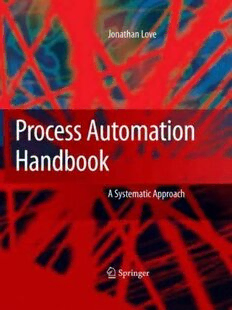
Process Automation Handbook: A Guide to Theory and Practice PDF
1051 Pages·2007·23.854 MB·English
Most books are stored in the elastic cloud where traffic is expensive. For this reason, we have a limit on daily download.
Preview Process Automation Handbook: A Guide to Theory and Practice
Description:
To be effective as an engineer practicing in the field of process automation requires a breadth of knowledge across a wide range of disciplines: chemical engineering, instrumentation, electrical engineering, control theory, mathematics, computing and management. Previously published books exist in these areas but most are generic and, of those that are applied in nature, few are oriented towards the actual needs of the chemical and process industry. It is impractical for engineers and unreasonable for students to have to cope with this spectrum of material and lack of emphasis. The objective of Process Automation Handbook has been to distil into a single coherent handbook all the essentials of process automation at a depth sufficient for most practical purposes. The handbook focuses on the knowledge needed to cope with the vast majority of process control and automation situations. In doing so, a number of sensible balances have been carefully struck between breadth and depth, theory and practice, classical and modern, technology and technique, information and understanding. A thorough grounding is provided for every topic. If more detailed information is required, the reader is referred to more specialised texts in the knowledge that he or she has been provided with a sound platform to ask the right questions and understand the answers. Process Automation Handbook will be of value to any engineer actively concerned with process control and automation in the chemical and process industries and final-year undergraduate and postgraduate students studying process control.
See more
The list of books you might like
Most books are stored in the elastic cloud where traffic is expensive. For this reason, we have a limit on daily download.
